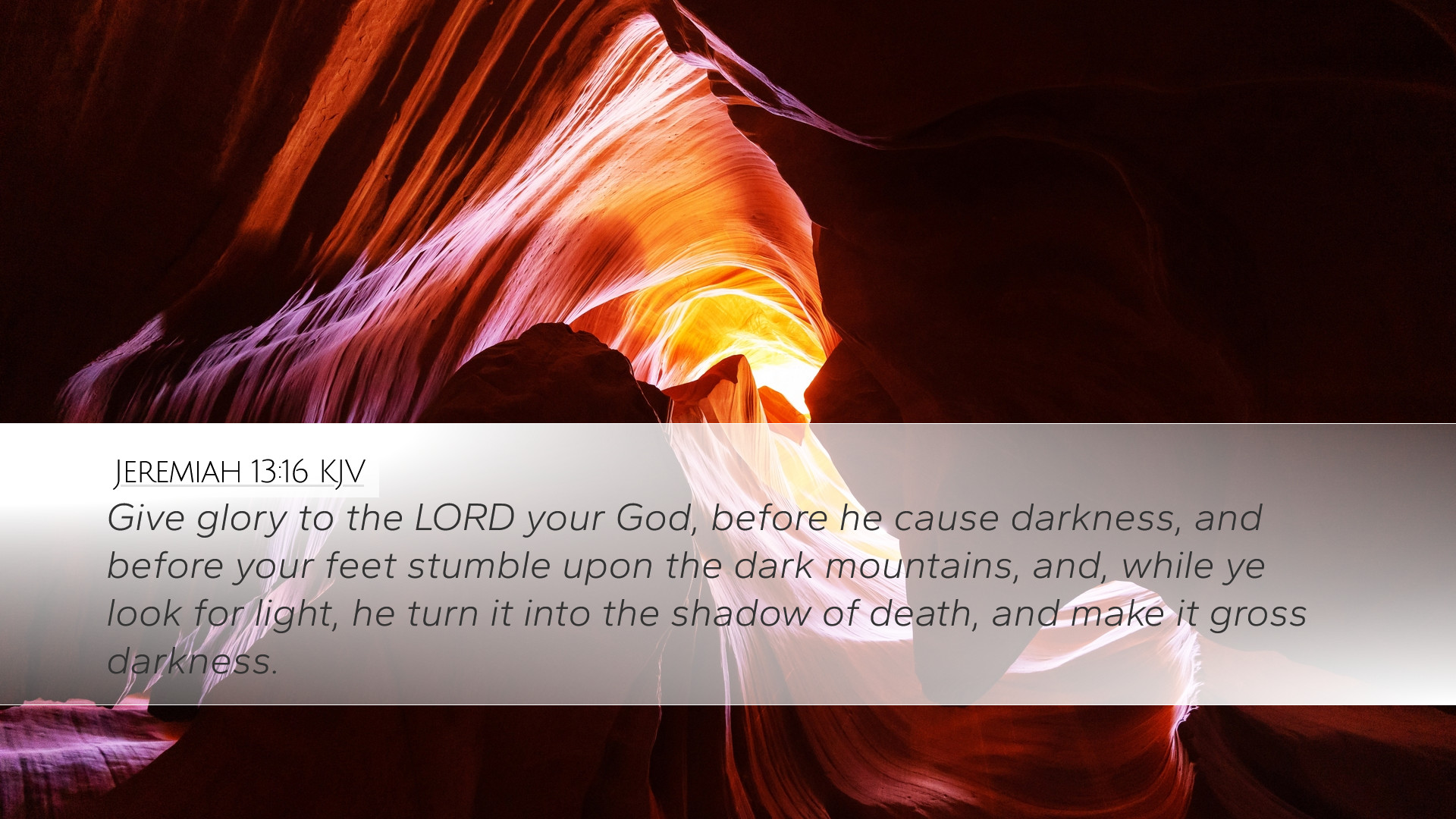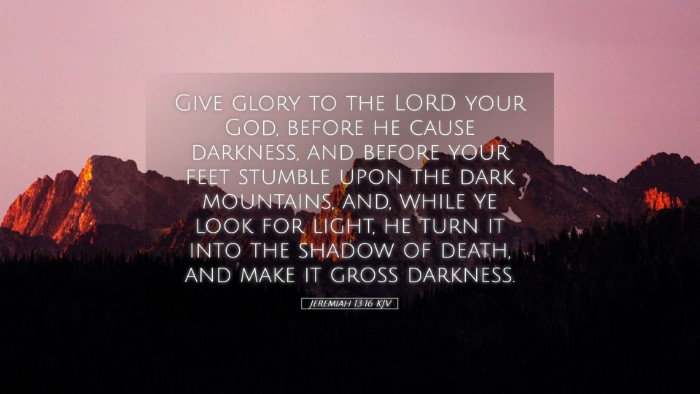Commentary on Jeremiah 13:16
Jeremiah 13:16 states, "Give glory to the LORD your God before he causes darkness, and before your feet stumble upon the dark mountains, and while you look for light, he turn it into the shadow of death, and make it gross darkness." This verse serves as a poignant warning about the spiritual and moral decline of the people of Judah and a call to repentance and recognition of God's divine authority.
Contextual Background
To fully grasp the significance of this verse, it is crucial to consider the historical and theological context of Jeremiah's ministry. Jeremiah, often termed the "weeping prophet," prophesied during a tumultuous period leading up to the Babylonian exile. The nation was steeped in idolatry, injustice, and a general disregard for God's commandments. His message combines elements of judgment, hope, and the unyielding faithfulness of God.
The Call to Give Glory
The verse begins with a direct exhortation: "Give glory to the LORD your God." This imperative underscores a fundamental tenet of the faith—the necessity of glorifying God through acknowledgment of His sovereignty, holiness, and righteous judgment.
-
Matthew Henry emphasizes that glorifying God requires a heart posture that recognizes His greatness, particularly when facing imminent judgment. He insists that such recognition must precede any spiritual transformation.
-
Albert Barnes highlights the sense of urgency within Jeremiah's words, interpreting them as a last appeal for the people to turn from their ways. He sees this glorification as essential for averting the coming calamity.
-
According to Adam Clarke, giving God glory also encompasses actions—specifically, living a life reflective of God’s attributes, which includes justice, mercy, and humility.
The Warning of Impending Darkness
Following this call to glorification, the verse starkly contrasts the call with the imagery of impending darkness. "Before he causes darkness..." foreshadows the judgment that awaits should they fail to heed the prophet's warning. This darkness signifies spiritual blindness, confusion, and despair that results from separation from God.
-
Matthew Henry explains that this darkness is both a metaphor for divine judgment and an actual consequence of persistent sin. Those who refuse to honor God can expect a withdrawal of His light—a theme prevalent in both Old and New Testaments.
-
In his commentary, Barnes suggests that the "dark mountains" symbolize the obstacles and difficulties that arise when one is estranged from God. Such imagery speaks to the depth of spiritual disarray when one neglects personal and communal accountability to God.
-
Clarke notes that this darkness can take various forms, including emotional turmoil, societal chaos, or spiritual desolation, underscoring the holistic effect of divine judgment on both individual and community life.
Light and Darkness: A Theological Reflection
The climactic shift in this verse occurs with the admonition, "while you look for light, he turn it into the shadow of death..." This phrase carries a theological weight, reflecting humanity's inherent struggle to attain righteousness apart from divine assistance. The light of God represents hope, truth, and life, whereas the shadow of death encapsulates despair and separation from the divine source of existence.
-
Henry argues that this vast shift from light to darkness manifests when individuals or communities consistently reject God’s guidance, portraying a worldview that transitions from hope into hopelessness.
-
Barnes correlates the metaphorical darkness to the anticipatory conditions of exile and judgment Judah would face, illustrating the gravity of the situation and the despair that follows disobedience.
-
According to Clarke, this spiritual journey reflects a common human experience—a tendency to seek light in one's own strength, only to encounter the stark reality of one’s limitations when divorced from God’s presence.
Practical Applications
The implications of Jeremiah 13:16 reverberate through time and resonate with modern readers, particularly clergy, students, and scholars alike. The urgent call to glorify God, the recognition of impending darkness, and the need for light are themes that transcend historical context and offer timeless truths.
-
For pastors, this passage serves as a powerful reminder to emphasize the importance of glorifying God in every aspect of ministry. Leaders are to inspire congregations to seek a deeper and more authentic walk with God.
-
Theologically, scholars may explore how Jeremiah’s message illuminates the broader narrative of redemption and judgment present throughout Scripture, offering deep insight into the nature of God.
-
Students of the Bible are encouraged to view this verse as a lens for reflecting on personal faith. It invites self-examination regarding their own glorification of God and reliance on His light amid personal challenges.
Conclusion
Jeremiah 13:16 poignantly encapsulates a divine warning laden with significance for all readers. The call to glorify God stands as an essential response to the realities of spiritual darkness that pervade humanity. The tension between light and darkness not only highlights the need for God’s presence but also reveals the consequences of straying from Him. Thus, this verse serves as both a prompt for immediate action and a profound theological invitation to embrace the fullness of life found in glorifying God.


